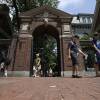When Yuly Mosca got an email about the COVID-19 vaccine being available, she signed up for an appointment. She is a registered nurse at Cambridge Health Alliance (CHA) PACE, a program that provides home care for older patients — including those with COVID-19 — who would otherwise be in nursing homes. However, when Mosca got a follow up email with the exact time of her vaccine appointment, she was hesitant.
“I was like, ‘Well, I’m not that ready to get it, like, right away,’ ” Mosca said, remembering that her head buzzed with reasons not to get the shot.
First, she said, “we don't know the long-term side effects of it.”
Second, Mosca added, “I don't want to be the first one to get it.”
Third, even after months of taking care of COVID patients, she still hadn’t gotten sick.
“I don't think I need it,” Mosca recalled thinking in mid-December, as the very first COVID vaccines were being given in Massachusetts.
So, Mosca decided to cancel her appointment. And she is not alone. Healthcare workers were the first people to be eligible for the vaccine in Massachusetts, but a significant percentage of them opted against getting it.
Several local medical systems — from long-term care facilities to hospitals — told GBH News that somewhere between a quarter and a third of their employees decided not to get the shot. This is consistent with finding from a recent survey by the Kaiser Family Foundation.
Some medical experts have expressed concern over the refusal rate and are seeking ways to convince more people of the vaccine’s efficacy and safety. Others have said they feared the hesitancy would be even higher and they are reassured by the initial vaccination efforts, even though they hope the numbers will eventually improve.
Around a third of CHA PACE staff declined the vaccine.
“It was just really discouraging,” said Jed Geyerhahn, the program's executive director. “The group that was declining the vaccination highly aligned with people of color, and so that really gave us pause.”
Geyerhahn said he knew he needed to do something about this, because communities of color have been disproportionately affected by COVID. So, he reached out to Multicultural Affairs at CHA.
Avlot Quessa oversees that office and said, even though he is strongly advocating for everyone to get vaccinated, he understands what is behind these numbers.
“There is a level of fear and there's a level of mistrust by people of color of our medical establishment. And there are valid reasons for that,” Quessa said.
Quessa, who is Haitian, said within his community, the vaccine has conjured up memories of U.S. health programs that went awry decades ago. Others have referenced the lasting trauma of the Tuskegee experiment and systematic racism.
At CHA, Quessa said, they have been reaching out to communities of color by offering town halls where people can ask questions, by publicizing and celebrating people who do get the vaccine, and by encouraging one-on-one peer conversations.
Geyerhahn said the number of PACE staff members who have declined the vaccine has reduced, from about a third to about a quarter. And he’s hopeful this number will keep dropping.
At Mass General Brigham, about 75 percent of eligible health care workers have been vaccinated, according to Paul Biddinger, who is overseeing the hospital network’s vaccine rollout. He said while they are continuing to combat rumors and misinformation, he is happy with the rate.
“It's encouraging, frankly, to see how quickly we got to 75 percent of our workforce,” Biddinger said, “Years ago, it would take hospitals a much, much, much longer time to get to 80 percent or 75 percent with the flu vaccination.”
Clarence Plant, who runs the skilled-nursing facility Odd Fellows Home in Worcester, said he’s optimistic too. About 70 percent of his staff agreed to get the vaccine initially. He said most of the resistance was among staff members who come from communities of color.
As an African-American man, he said, he made sure to get the vaccine first to show that it was safe.
“More and more African Americans are coming up to the plate and taking the vaccine, when some of them seriously resisted it in the past,” Plant said.
Quessa said ensuring health care workers understand the safety and importance of the vaccine is especially critical as their patients are deciding whether or not to be vaccinated.
“They can be a really important force in helping patients to make that decision,” Quessa said.
As the post-holiday surge in COVID cases took hold, Yuly Mosca started regretting her decision not to get the vaccine. She was treating numerous COVID patients every day, she said. There was a moment when she was trying to draw blood from a patient, and she couldn’t.
“I was afraid, and literally, my hands were shaking,” she remembered.
Looking at her shaking hands, she decided to reverse course and get the vaccine, which she did in late December.
Not long after, her husband and two-year-old son came down with COVID. Her husband self-isolated, but Mosca just couldn’t separate from her son. Despite being with her ill son, she kept getting back negative COVID test results for herself.
“It was a miracle for me, but it's not really a miracle,” Mosca said.
The miracle was science, she said.





